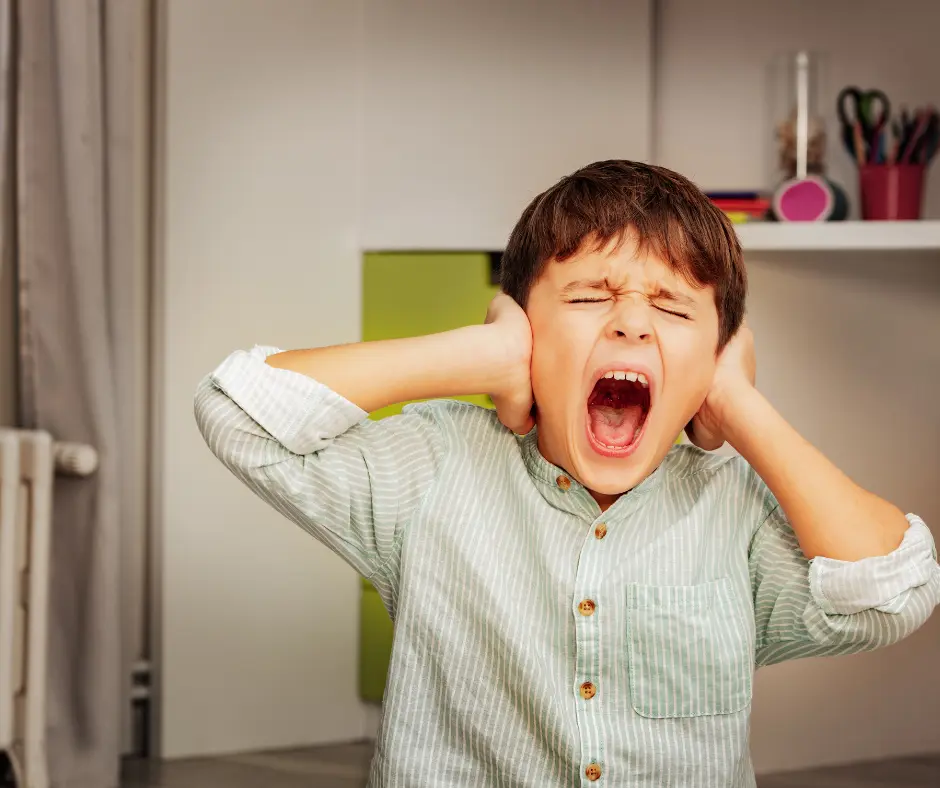How does ADHD manifest?
- Misbehaves,
- Doesn’t listen,
- Can’t sit still for long,
- Takes toys from other children,
- You have to tell them everything ten times,
- Seems like they’re not even paying attention to you,
- Sleeps poorly at night (and hardly at all during the day)…

Are these symptoms still "normal and something they will grow out of," or is it already Attention Deficit Hyperactivity Disorder (ADHD)?
“My son is energetic, restless, and lively. He never crawled, just went straight to walking. Before I could turn around, at 10 months old, he was standing on the kitchen counter. He never slept—I have no idea where he got the energy. Today, he enjoys climbing trees, refuses to listen, and immediately gets frustrated."
Does he have ADHD, or is he simply a completely healthy, curious child with a strong inclination toward sports and movement in general, making it difficult for him to sit with his peers and calmly draw a rainbow?
In this article, we will help you observe and recognize symptoms of ADHD or ADD in your child (or even in yourself)
- How ADHD manifests,
- When to start noticing certain developmental abnormalities in your child,
- When, how, and why to address ADHD in your child.
The purpose of this article is not to make you feel doubtful, anxious, or guilty.On the contrary, the goal is to show you a way toward possible solutions.
ADHD (Attention Deficit Hyperactivity Disorder) is a neurodevelopmental disorder characterized by inattention, hyperactivity, and impulsivity.
"ADHD is a hereditary neurodevelopmental syndrome caused by impaired functioning in areas of the brain responsible for planning, foresight, focus, sustained attention, and self-control." [2]
There is also a variant of Attention Deficit Disorder without hyperactivity, known as ADD (Attention Deficit Disorder).This leads us to the first challenge in making an accurate diagnosis.
ADHD often coexists with other disorders:
- Learning disabilities,
- Speech and behavioral disorders,
- Eating disorders,
- Autism,
- Tics, and more.
That’s why, if you notice persistent irregularities in your child’s behavior, it’s advisable to consult a specialist - starting with a pediatrician and then a child psychologist.
How to recognize if my child has ADHD?
Experts generally recommend diagnosing ADHD in preschool or early school years when behavioral differences between children with and without ADHD become very pronounced.However, some studies suggest that early symptoms can be observed as early as infancy and toddlerhood.
One of the first signs of ADHD in babies is a disrupted biorhythm:
They are awake at night, refuse to sleep, and tend to nap during the day.
While this is normal for newborns who gradually adjust on their own, children with ADHD often continue to struggle with sleep issues for years. They may take a long time to fall asleep, wake up frequently, move restlessly in their sleep, talk in their sleep.

These children often stop needing naps earlier than usual, which can disrupt their later adaptation to kindergarten.
Other common signs include increased restlessness and frequent crying.
Toddlers with ADHD tend to be physically "ahead," sometimes even skipping developmental stages (e.g., they never crawl and go straight to walking).
They move as if they have no sense of fear or limitations, yet they tend to be clumsy, frequently stumbling and falling.
They also exhibit low frustration tolerance:Even minor annoyances can trigger strong reactions, and they often express their anger, dissatisfaction, or defiance loudly, explosively, and sometimes aggressively (hitting a parent or another child, grabbing a toy, etc.).
Most parents are familiar with the so-called "terrible twos," but children with ADHD express their frustration much more intensely, and their tantrums usually last significantly longer.
By preschool age, many parents notice that their child frequently forgets where they left their toys, balls, or clothes—even though they’re always in the same place.
The child struggles to focus, needs instructions repeated multiple times a day, and often seems completely unaware that someone is speaking to them.

They may also have difficulties with self-care (e.g., putting on a shirt inside out or backward).
As children enter kindergarten and school, they are expected to develop better concentration, control impulsive behaviors (e.g., shouting out, interrupting), and regulate hyperactivity.
Let’s break down the individual symptoms:
How does attention deficit manifest?
- Difficulty starting to focus on tasks,
- Easily distracted,
- Takes a long time to return to a task after being interrupted,
- Forgetfulness (frequently loses items, misplaces things, forgets what they were supposed to do). [1]
How does hyperactivity manifest?
- Cannot stay still,
- Constantly moves around, jumps, fidgets,
- Plays with their hands,
- Talks excessively and makes noises (often even at night in their sleep).
How does impulsivity manifest?
- Acts without thinking,
- Shouts out answers,
- Interrupts others,
- Disrupts group activities,
- In mild cases, struggles with social interactions,
- In severe cases, experiences frequent injuries due to reckless behavior. [1]
"As children grow, visible symptoms of hyperactivity (constant movement, impatience, acting as if they have a 'motor' inside them) often diminish. However, problems with inattention, impulsive behavior, and inner restlessness usually persist. Emotional immaturity, mood swings, sudden anger outbursts, and impulsive decision-making also remain common." [2]
Now, let’s focus on an area that might not seem related to ADHD at first glance—diet.
Many conventional ADHD/ADD treatment approaches overlook this connection.
However, Dr. Natasha Campbell-McBride discovered a crucial link.
How does your child eat?
- After breastfeeding, did you switch to sweet cereals and fruit pouches?
- Do they prefer sweet yogurts, crackers, cookies, biscuits, and bread rolls?
- Are they extremely picky, only eating plain pasta, rice, or potatoes for lunch?
- Do they drink only sweet teas and fruit juices?
- Do they reject meat, vegetables, eggs, or plain yogurt?
This diet may not immediately show on their weight—many of these children remain thin, so it often goes unnoticed.
"They’ll grow out of it."
Dr. Natasha Campbell-McBride’s research shows that children diagnosed with autism, ADHD, dyslexia, dyspraxia, depression, schizophrenia, and other conditions often suffer from leaky gut syndrome.
In simple terms, their intestines are overrun with harmful bacteria that transform food into toxins, which then pass directly into the bloodstream and lymphatic system. These toxins reach the brain, affecting perception, learning, and development. When Dr. Campbell-McBride’s son was three years old, he was diagnosed with autism. As a medical professional, she immersed herself in research to find ways to help him. Through diet, she healed his gut and digestion. Today, he lives a normal life without any signs of autism.
Do not underestimate your child’s dietary habits.
If you're thinking, "I'll just give them probiotics and fix it,"—it’s not that simple.For more information, check out Dr. Natasha's book: GAPS Diet
https://www.janadellplotnarkova.cz/gaps-dieta/o-terapeuticke-diete-s-dr-natashou/
In our next article, we will explore whether and how ADHD can be treated.

